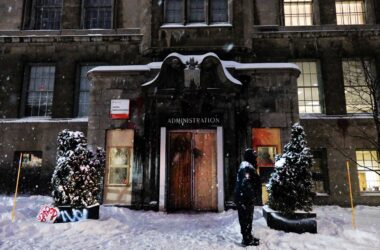Despite announcing earlier in the semester that the Winter 2021 semester will mostly take place remotely, on Nov. 4, McGill sent an email describing its intention to expand in-person teaching for Winter 2021. The news broke while COVID-19 outbreaks continued to rise within primary schools and high schools, and alongside growing evidence that the educational sector had become the main driver of transmission in Montreal. With winter approaching and new daily coronavirus cases plateauing at a high number, concerns about classroom ventilation are amplifying, and schools are scrambling to find alternative ways of preventing further outbreaks. Clearly, in-person teaching has been difficult to manage and has exacerbated the pandemic in Quebec.
Given the current situation in Montreal and my own experience with attending in-person classes, McGill’s decision is unreasonable. The school should be cautious when promoting it and students should not expect a high quality learning experience.
In their email outlining McGill’s plan for the winter semester, Associate Provost (Teaching & Academic Programs) Christopher Buddle and Deputy Provost (Student Life & Learning) Fabrice Labeau shared a link to a FAQ page that summarized the health precautions and tiers of academic activities to be implemented. However, the page did not mention or elaborate enough on important issues like ventilation and the use of masks. Indeed, the school has yet to disclose much about its COVID-19 ventilation plan. Although masks are mandatory when commuting indoors, once students are seated, they are not, and instructors cannot require students to wear them. Having been inside a socially-distanced classroom, I can attest that students are seated closer than one would expect and that there remains a significant health risk. Aerosols, such as those produced by sneezes, can reach distances over two meters, and students may forget to put their masks on when moving around. The school should reconsider the spacing of seats, or enforce the wearing of masks in classrooms.
Furthermore, although McGill’s administration has recognized that students prefer in-person teaching, it cannot expect most of them to show up. Many students have already decided to stay away from campus for the winter. Ensuring that these students are able to participate equally can add additional strain to professors and TAs, who will need to balance two very different teaching formats this upcoming semester.
Beyond the specifics of in-person courses, the pandemic is unpredictable, and students may not even have the opportunity to come to school. McGill moved ongoing courses that would be classified under the “Tier 2” category online when Montreal entered the red zone in early October, and they have yet to be held in person again. Tier 2 teaching, which consists of seminars, conferences, tutorials, and lectures, will be moved back online this winter if the city remains or re-enters the red zone—a highly likely scenario. Sudden switches in course delivery can be burdensome and confusing for faculty and students alike. The evidence shows clearly that there is uncertainty regarding the progression of COVID-19, and students’ learning will be impacted by new developments.
Although the prospect of attending in-person courses is exciting for many students, expanding them may not be realistic. This is due in part to concerns regarding the school’s ventilation systems, the lack of information on the health measures that will be implemented, the low number of students that will be able to attend, and the possibility of remaining in a red zone. Although McGill has reported few cases of COVID-19 transmission on McGill’s campus, the school needs to be more explicit about its plan for Winter 2021 and must reconsider some of the measures it put into place previously. In the meantime, students must demand more information from McGill and, unfortunately, not get their hopes up about having a quality experience on campus next semester.









